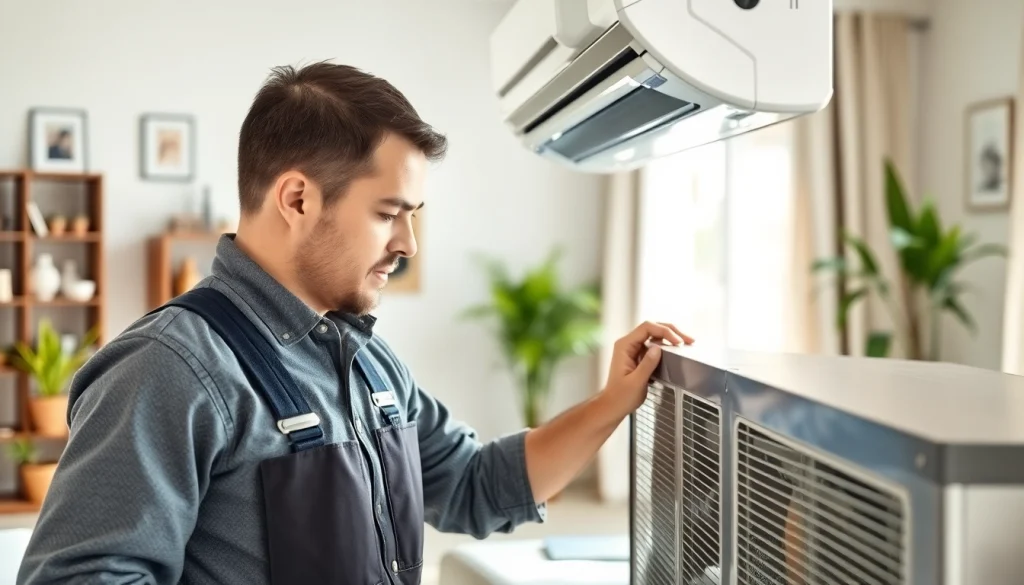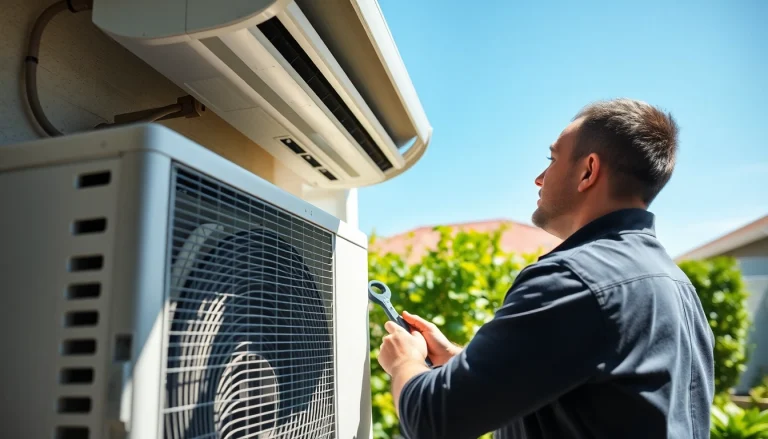
In the scorching heat of Phoenix, Arizona, having a functional air conditioning system is not just a luxury—it’s a necessity. As temperatures climb, homeowners increasingly seek out reliable ac repair phoenix az services to ensure comfort and peace of mind. However, even the most advanced cooling systems can encounter issues over time. This comprehensive guide will navigate you through common air conditioning problems, the importance of maintenance, and considerations for choosing the right repair service.
Understanding AC Repair Phoenix AZ: Common Issues and Solutions
Identifying Signs Your AC Needs Repair
Recognizing early warning signs of AC malfunction is crucial for homeowners in Phoenix. Common indicators that your air conditioning unit may require repair include:
- Insufficient Cooling: If your AC fails to cool your space adequately, it may struggle with refrigerant levels or have a malfunctioning compressor.
- Increased Energy Bills: A sudden spike in energy costs can indicate your unit is working harder than it should, possibly due to inefficiencies or needed repairs.
- Strange Noises: Unusual sounds, such as grinding or squeaking, can signify mechanical failure or debris trapped in the system.
- Unpleasant Odors: Foul smells can point to mold growth within the system or burnt-out wiring that needs immediate attention.
- Frequent On/Off Cycling: If your AC unit frequently turns off and on, it may indicate an issue with the thermostat or other electrical components.
Key Components That Often Fail in Air Conditioners
Understanding the key components of your air conditioning system can help you diagnose potential issues more effectively. Common components that typically fail include:
- Compressor: Often regarded as the heart of the AC system, if the compressor fails, it can result in the unit not cooling at all.
- Capacitor: This component gives the compressor and the motors the necessary voltage to start. When it malfunctions, it can prevent the system from functioning properly.
- Evaporator Coils: These coils can become frozen due to low refrigerant levels or airflow problems, severely impeding the cooling process.
- Thermostat: If the thermostat is faulty, it can’t accurately gauge the home’s temperature, leading to inconsistent cooling.
- Ductwork: Leaks in the ductwork can compromise the efficiency of your AC system, causing cool air to escape before it reaches the living area.
Common Myths Surrounding AC Repairs Dispelled
Several myths surround AC repairs that can mislead homeowners. Dispelling these misconceptions can lead to more informed decisions:
- Myth 1: You Can Ignore Small Issues: Homeowners often think minor issues will resolve themselves, but neglect can lead to costlier repairs down the road.
- Myth 2: All Repairs Are Expensive: While some repairs can be costly, many issues can be resolved without breaking the bank when promptly addressed.
- Myth 3: Regular Maintenance Isn’t Necessary: Regular maintenance is crucial for extending the lifespan of your AC unit and prevents the majority of failures.
- Myth 4: Only Professional Service Can Fix Issues: While professional service is recommended for most repairs, certain minor problems can be addressed by knowledgeable homeowners.
Choosing the Right AC Repair Phoenix AZ Services
Factors to Consider When Selecting an HVAC Service Provider
Choosing the right HVAC service provider is essential for quality AC repair. Consider the following factors:
- Experience: Look for companies with a proven track record in the HVAC industry and experience in handling various brands and systems.
- Licensing and Certification: Verify that the technician has the required licenses and certifications, ensuring they are qualified to perform repairs.
- Insurance Coverage: An adequately insured company protects you and the workers from potential liabilities during the repair process.
- Service Agreements: Some companies offer maintenance agreements that can save you money and keep your system functioning efficiently.
Questions to Ask Before Hiring an AC Repair Technician
Before hiring an AC repair technician, it’s vital to ask the right questions to assess their suitability:
- What is your experience with this brand? Ensure they have specific expertise with your AC unit’s manufacturer.
- Can you provide references or testimonials? This will help gauge the quality of their service.
- What is your response time for emergency repairs? Knowing their availability can be crucial, particularly during peak summer months.
- What warranty do you offer on repairs? A warranty can provide peace of mind regarding the quality of the repair work.
- How do you handle billing and payment? Understanding their billing procedures upfront can prevent surprises later on.
The Importance of Reviewing Customer Feedback
Customer reviews are invaluable for selecting an HVAC service. Websites that aggregate reviews can help you find reliable contractors. Look for metrics such as:
- Overall Satisfaction: Higher ratings generally indicate a history of satisfied customers.
- Response to Negative Reviews: How a company reacts to dissatisfied customers can provide insight into their customer service approach.
- Specific Service Feedback: Pay attention to reviews detailing specific types of repairs and the performance of technicians.
Cost Factors in AC Repair Phoenix AZ
Understanding Average Repair Costs by Component
Costs for AC repairs can vary significantly based on the component requiring repair. Here’s an overview of average costs:
- Compressor Replacement: $1,200 – $2,500
- Fan Motor Replacement: $300 – $600
- Capacitor Replacement: $100 – $400
- Thermostat Replacement: $120 – $300
- Refrigerant Recharge: $100 – $300
When to Repair vs. Replace Your AC Unit
Determining whether to repair or replace your AC unit can be crucial. Consider the following:
- If your unit is less than 10 years old, repairing is typically more sensible.
- If repair costs approach 50% of the replacement cost, replacement may be a wiser choice.
- Consider the energy efficiency of a new unit versus the performance of your current system.
Financing Options Available for AC Repair Services
Many HVAC companies offer financing options to help homeowners manage repair costs. Financing may include:
- Low-interest loans: Allows you to spread the repayment over several months or years.
- Payment plans: Flexible plans that let you pay in installments.
- Special promotions: Occasionally, companies offer promotional financing options during peak seasons or special events.
Preventive Maintenance for Air Conditioning Systems
Essential Maintenance Tasks to Avoid Premature Breakdowns
Regular maintenance can significantly reduce the chance of unexpected breakdowns. Key maintenance tasks include:
- Cleaning or replacing filters: Regularly check and replace filters to promote better airflow and efficiency.
- Inspecting ductwork: Ensure ducts are clean and sealed to maximize cooling efficiency.
- Checking refrigerant levels: Low refrigerant can impede cooling effectiveness and efficiency.
- Cleaning coils: Dirty evaporator and condenser coils can drastically reduce capacity.
Recommended Seasonal Maintenance Schedule
Creating a seasonal maintenance schedule can help you stay on top of your AC system’s health:
- Monthly: Change or clean filters.
- Before Summer: Schedule a professional inspection and tune-up.
- Mid-Season: Clean or maintain outdoor units and check refrigerant levels.
The Role of Filter Changes in AC Efficiency
Filters play a crucial role in air conditioning efficiency. Here’s how regular changes impact performance:
- Improved Airflow: Clean filters allow air to flow freely, improving the system’s cooling ability.
- Energy Savings: A clean filter can decrease energy consumption by up to 15%.
- Better Air Quality: Regular filter changes can reduce allergens and improve indoor air quality.
Improving Indoor Air Quality During AC Repair Phoenix AZ
How AC Repair Can Enhance Air Quality
Proper AC repair can significantly enhance indoor air quality. Here’s how:
- Eliminating Contaminants: Repairs that address duct leaks or mold can drastically reduce harmful pollutants in the air.
- Maintaining Humidity: Properly functioning systems maintain optimal humidity levels, which is crucial for air quality.
Integrating Air Purification Systems with Your AC
Many homeowners are integrating advanced air purification systems with their HVAC setup to improve air quality further. Common types of systems include:
- HEPA Filters: Traps small particles, improving air quality significantly.
- UV Light Systems: Eliminate pathogens and reduce mold and bacteria levels.
- Activated Carbon Filters: Absorb odors and harmful gases, enhancing overall air cleanliness.
Common Indoor Air Quality Issues and Their Solutions
Indoor air quality can be impacted by various issues. Here are common problems and their recommended solutions:
- Dust and Allergens: Regular cleaning and HEPA filtration can mitigate this issue.
- Mold Growth: Address moisture issues and schedule regular maintenance to prevent mold development.
- Odors: Implement air purification systems and consider duct cleaning to ensure stale air isn’t recirculated.






